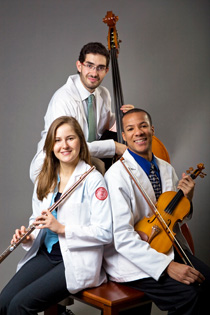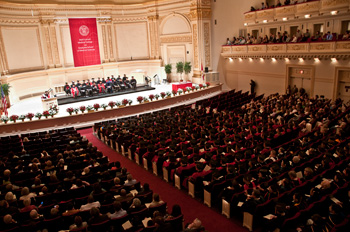Med school's music and medicine program scores with student quintet at Carnegie Hall
It's an old joke: An aspiring musician with an instrument in hand asks a New Yorker, "Pardon me, how do I get to Carnegie Hall?" The reply: "Practice, practice, practice."

Issac Klein (M.D./Ph.D. student) on bass, Elena Bukanova (fourth-year student) on flute and Curtis O'Neal (M.D./Ph.D.) on violin. They are just Just three of the dozens of Weill Cornell students involved in the college's Music and Medicine Initiative. Photo by Tom Moore.
That old saw is getting a new punch line: Go to medical school at Weill Cornell Medical College.
The Music and Medicine Initiative at WCMC is not even a year old, but it is about to strike a major chord: A WCMC student quintet will play at Carnegie Hall June 3 during WCMC's graduation ceremonies.
As a member of WCMC's admissions committee and a member of its board of overseers, Dr. David Shapiro, clinical professor of psychiatry at WCMC and chairman of the Music and Medicine Initiative, has read through hundreds of med school applications. "You realize that many of them are musicians," he says. "Some are conservatory trained, some are serious amateurs, but there is a very high incidence of people going into both medicine and musicianship."
A self-described amateur jazz drummer with a lifelong love of music, Shapiro is in good company; Cornell President David Skorton, a cardiologist with a WCMC appointment, is also a musician who serves on the Music and Medicine advisory board. "For a distinguished president and a pediatric cardiologist, he's damn good," Shapiro notes.
While musical medical students already tended to seek each other out and form musical groups, Shapiro thought that such a program, which became possible with funding from the New York City-based Block Family Foundation, would be even more beneficial. It allows some 30 students now in the program to balance their medical training with their musical passions, offering quiet rehearsal spaces, performance venues and mentors/volunteer tutors from partner institutions The Juilliard School and 92nd Street Y. The initiative can also pay the fees for students who want to join musical groups like the 92nd Street Y's orchestra.

Weill Cornell Medical College commencement ceremonies at Carnegie Hall in 2009. This year, a quintet of WCMC student musicians will play briefly on the Carnegie Hall stage as part of the ceremonies.
The partnerships will go both ways -- WCMC and NewYork-Presbyterian Hospital are beginning to work with The Juilliard School about issues such as motion disorders in dancers and performance anxiety, and can refer musicians with specific ailments to musician-friendly physicians at NewYork-Presbyterian Hospital/Weill Cornell Medical Center.
The program bolsters WCMC's developing forays into areas such as music and healing (a partnership with Memorial Sloan-Kettering Cancer Center) and music and research (neuroscience research groups at WCMC interested in studying music's effects on the brain). It also complements WCMC's Center for the Performing Artist, which has identified performers of many stripes as being underserved by physicians.
"To be a really good doctor and a performance-capable musician, you really need to be able to pay attention to detail and prepare immensely for whatever you do," says clarinetist Peter Morgenstern, a fourth-year WCMC med student on the Music and Medicine steering committee. He and a friend came up with the Carnegie Hall idea last fall "since we graduate at Carnegie Hall, and it is such a great musical arena." He will join colleagues playing two violins, a viola and a cello in a 10-minute performance of the fourth movement from Mozart's Quintet for Clarinet and Strings.
Ankit Patel '04, an M.D./Ph.D. student at WCMC, adds that medicine and music also both stress perseverance and a sense of empathy -- which is necessary to connect with both patients and music. "I haven't picked up my flute since high school, and this program has inspired me to start up again," says Patel, who has participated in several concerts by Dr. Richard Kogan, WCMC psychiatrist and a concert pianist who is vice chairman and artistic director for the Music and Medicine Initiative.
The program, Shapiro says, has already made a difference in admissions interviews. "We can tell them now -- we can help you find master coaches at Juilliard and playing venues … we can capture a few more students who have all kinds of top choices, people who would also really like to be a part of the New York musical community. That's one of our goals -- it can only enhance our desirability for top applicants."
For more information, visit the official site at www.med.cornell.edu/music/ or the student-run site at www.musicandmed.com.